The Role of Environmental Project Management in Construction Industry
VerifiedAdded on 2023/06/10
|17
|4070
|438
AI Summary
This research project analyses the role of environmental project management in construction industry. It focuses on the importance of environmental project management and its need in the construction industry. The research aims to understand the process of environmental project management, identify the challenges faced by the construction industry in making use of environmental project management, and recommend suitable methods and strategies of making effective use of environmental project management in construction industry. The research methodology includes a mixed methodology with the collection of both primary and secondary data.
Contribute Materials
Your contribution can guide someone’s learning journey. Share your
documents today.
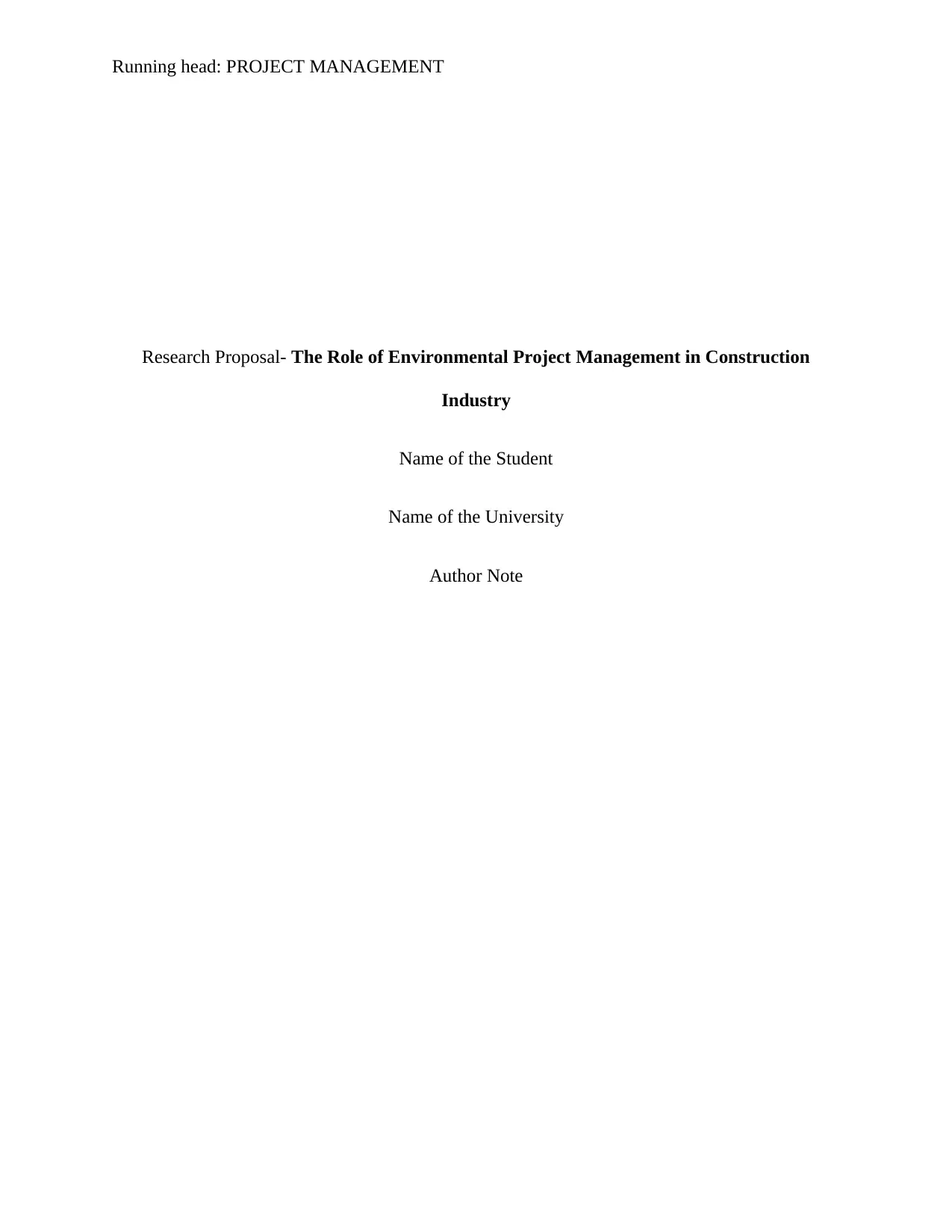
Running head: PROJECT MANAGEMENT
Research Proposal- The Role of Environmental Project Management in Construction
Industry
Name of the Student
Name of the University
Author Note
Research Proposal- The Role of Environmental Project Management in Construction
Industry
Name of the Student
Name of the University
Author Note
Secure Best Marks with AI Grader
Need help grading? Try our AI Grader for instant feedback on your assignments.
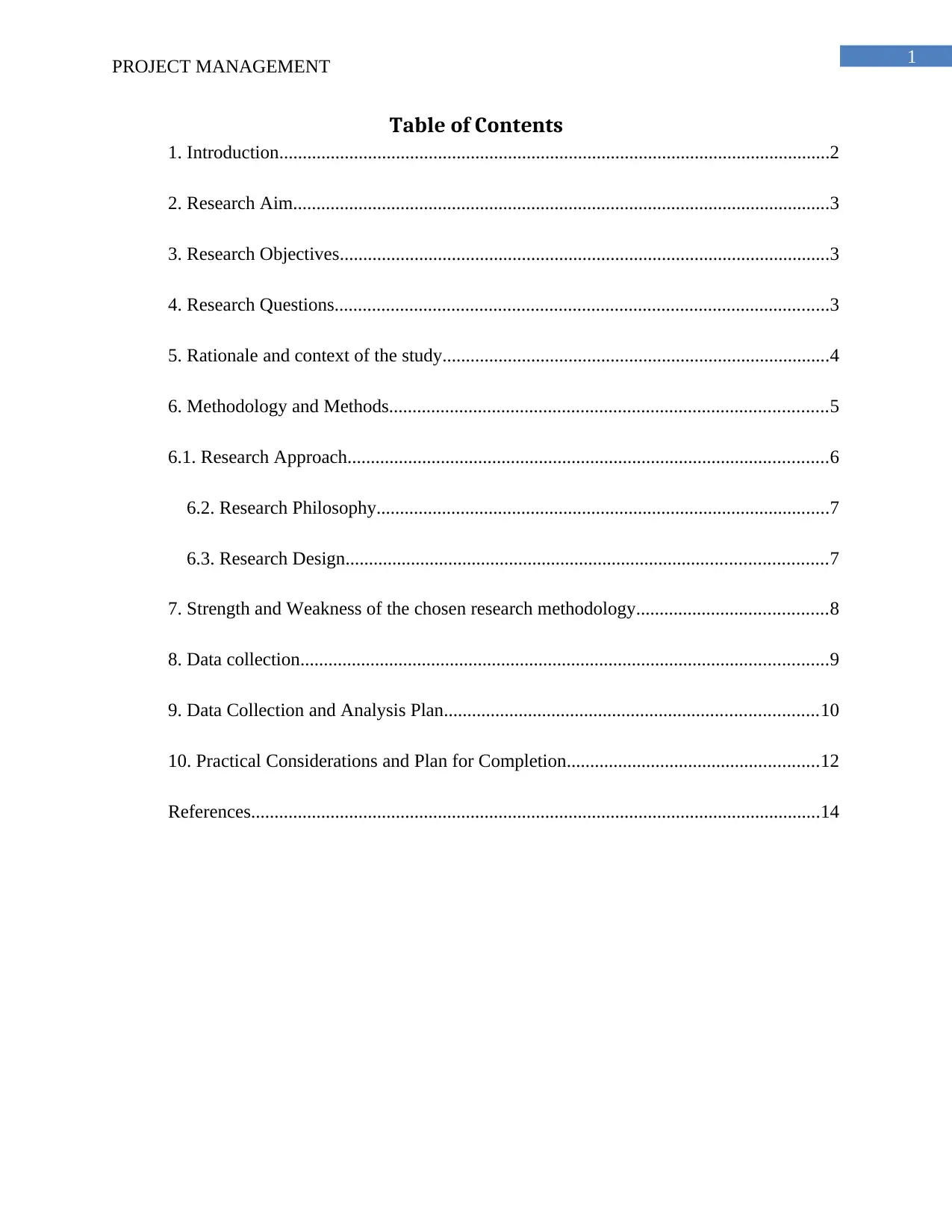
1
PROJECT MANAGEMENT
Table of Contents
1. Introduction......................................................................................................................2
2. Research Aim...................................................................................................................3
3. Research Objectives.........................................................................................................3
4. Research Questions..........................................................................................................3
5. Rationale and context of the study...................................................................................4
6. Methodology and Methods..............................................................................................5
6.1. Research Approach.......................................................................................................6
6.2. Research Philosophy.................................................................................................7
6.3. Research Design.......................................................................................................7
7. Strength and Weakness of the chosen research methodology.........................................8
8. Data collection.................................................................................................................9
9. Data Collection and Analysis Plan................................................................................10
10. Practical Considerations and Plan for Completion......................................................12
References..........................................................................................................................14
PROJECT MANAGEMENT
Table of Contents
1. Introduction......................................................................................................................2
2. Research Aim...................................................................................................................3
3. Research Objectives.........................................................................................................3
4. Research Questions..........................................................................................................3
5. Rationale and context of the study...................................................................................4
6. Methodology and Methods..............................................................................................5
6.1. Research Approach.......................................................................................................6
6.2. Research Philosophy.................................................................................................7
6.3. Research Design.......................................................................................................7
7. Strength and Weakness of the chosen research methodology.........................................8
8. Data collection.................................................................................................................9
9. Data Collection and Analysis Plan................................................................................10
10. Practical Considerations and Plan for Completion......................................................12
References..........................................................................................................................14
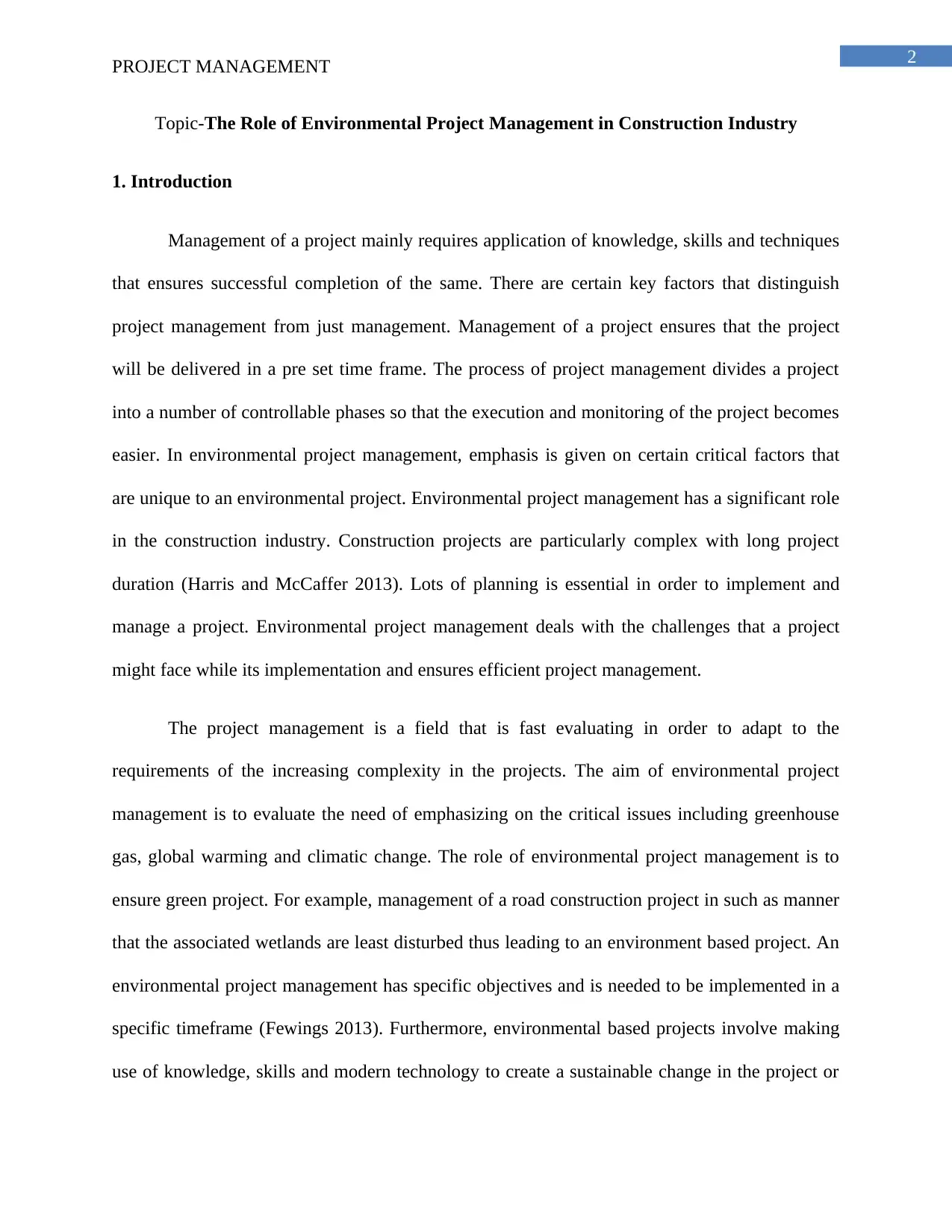
2
PROJECT MANAGEMENT
Topic-The Role of Environmental Project Management in Construction Industry
1. Introduction
Management of a project mainly requires application of knowledge, skills and techniques
that ensures successful completion of the same. There are certain key factors that distinguish
project management from just management. Management of a project ensures that the project
will be delivered in a pre set time frame. The process of project management divides a project
into a number of controllable phases so that the execution and monitoring of the project becomes
easier. In environmental project management, emphasis is given on certain critical factors that
are unique to an environmental project. Environmental project management has a significant role
in the construction industry. Construction projects are particularly complex with long project
duration (Harris and McCaffer 2013). Lots of planning is essential in order to implement and
manage a project. Environmental project management deals with the challenges that a project
might face while its implementation and ensures efficient project management.
The project management is a field that is fast evaluating in order to adapt to the
requirements of the increasing complexity in the projects. The aim of environmental project
management is to evaluate the need of emphasizing on the critical issues including greenhouse
gas, global warming and climatic change. The role of environmental project management is to
ensure green project. For example, management of a road construction project in such as manner
that the associated wetlands are least disturbed thus leading to an environment based project. An
environmental project management has specific objectives and is needed to be implemented in a
specific timeframe (Fewings 2013). Furthermore, environmental based projects involve making
use of knowledge, skills and modern technology to create a sustainable change in the project or
PROJECT MANAGEMENT
Topic-The Role of Environmental Project Management in Construction Industry
1. Introduction
Management of a project mainly requires application of knowledge, skills and techniques
that ensures successful completion of the same. There are certain key factors that distinguish
project management from just management. Management of a project ensures that the project
will be delivered in a pre set time frame. The process of project management divides a project
into a number of controllable phases so that the execution and monitoring of the project becomes
easier. In environmental project management, emphasis is given on certain critical factors that
are unique to an environmental project. Environmental project management has a significant role
in the construction industry. Construction projects are particularly complex with long project
duration (Harris and McCaffer 2013). Lots of planning is essential in order to implement and
manage a project. Environmental project management deals with the challenges that a project
might face while its implementation and ensures efficient project management.
The project management is a field that is fast evaluating in order to adapt to the
requirements of the increasing complexity in the projects. The aim of environmental project
management is to evaluate the need of emphasizing on the critical issues including greenhouse
gas, global warming and climatic change. The role of environmental project management is to
ensure green project. For example, management of a road construction project in such as manner
that the associated wetlands are least disturbed thus leading to an environment based project. An
environmental project management has specific objectives and is needed to be implemented in a
specific timeframe (Fewings 2013). Furthermore, environmental based projects involve making
use of knowledge, skills and modern technology to create a sustainable change in the project or
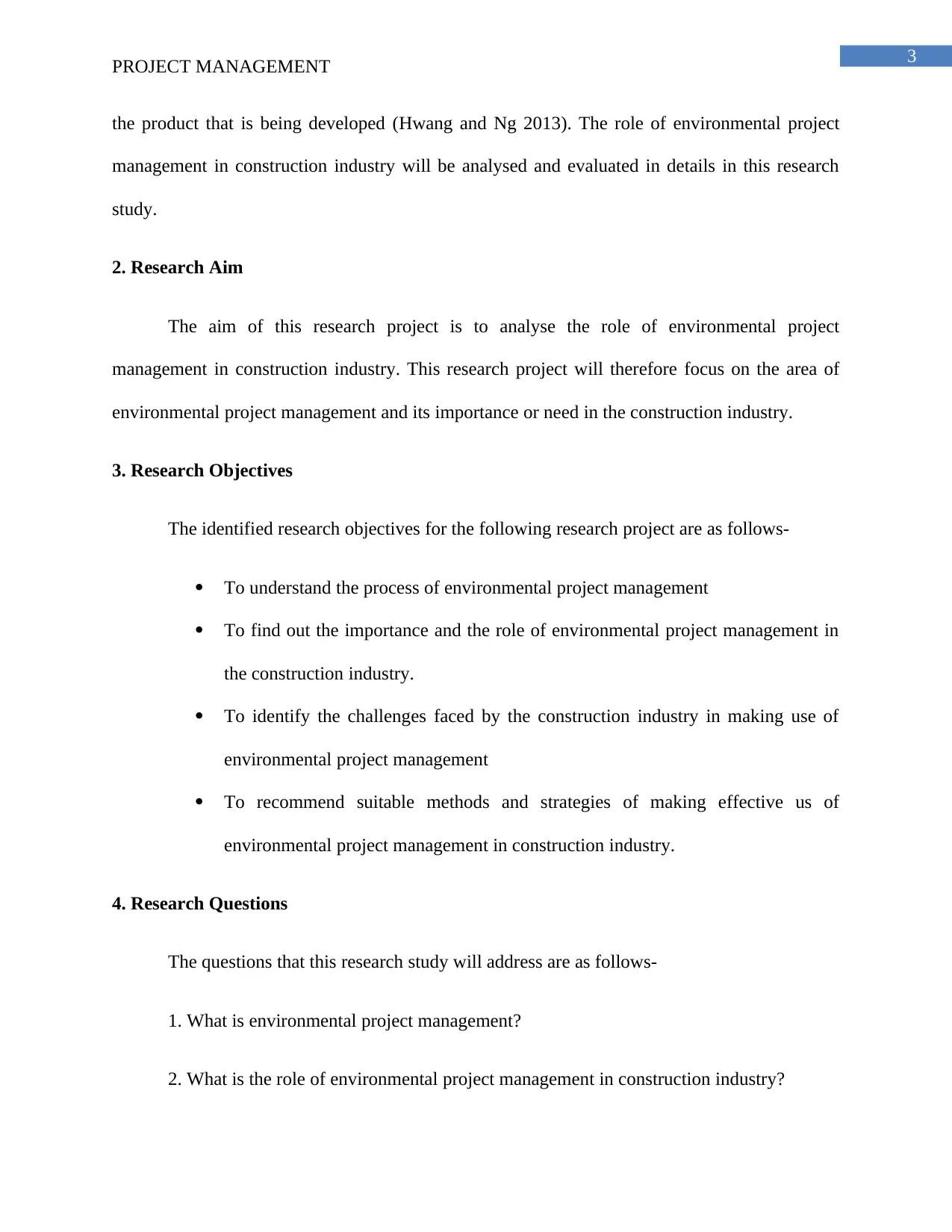
3
PROJECT MANAGEMENT
the product that is being developed (Hwang and Ng 2013). The role of environmental project
management in construction industry will be analysed and evaluated in details in this research
study.
2. Research Aim
The aim of this research project is to analyse the role of environmental project
management in construction industry. This research project will therefore focus on the area of
environmental project management and its importance or need in the construction industry.
3. Research Objectives
The identified research objectives for the following research project are as follows-
To understand the process of environmental project management
To find out the importance and the role of environmental project management in
the construction industry.
To identify the challenges faced by the construction industry in making use of
environmental project management
To recommend suitable methods and strategies of making effective us of
environmental project management in construction industry.
4. Research Questions
The questions that this research study will address are as follows-
1. What is environmental project management?
2. What is the role of environmental project management in construction industry?
PROJECT MANAGEMENT
the product that is being developed (Hwang and Ng 2013). The role of environmental project
management in construction industry will be analysed and evaluated in details in this research
study.
2. Research Aim
The aim of this research project is to analyse the role of environmental project
management in construction industry. This research project will therefore focus on the area of
environmental project management and its importance or need in the construction industry.
3. Research Objectives
The identified research objectives for the following research project are as follows-
To understand the process of environmental project management
To find out the importance and the role of environmental project management in
the construction industry.
To identify the challenges faced by the construction industry in making use of
environmental project management
To recommend suitable methods and strategies of making effective us of
environmental project management in construction industry.
4. Research Questions
The questions that this research study will address are as follows-
1. What is environmental project management?
2. What is the role of environmental project management in construction industry?
Secure Best Marks with AI Grader
Need help grading? Try our AI Grader for instant feedback on your assignments.
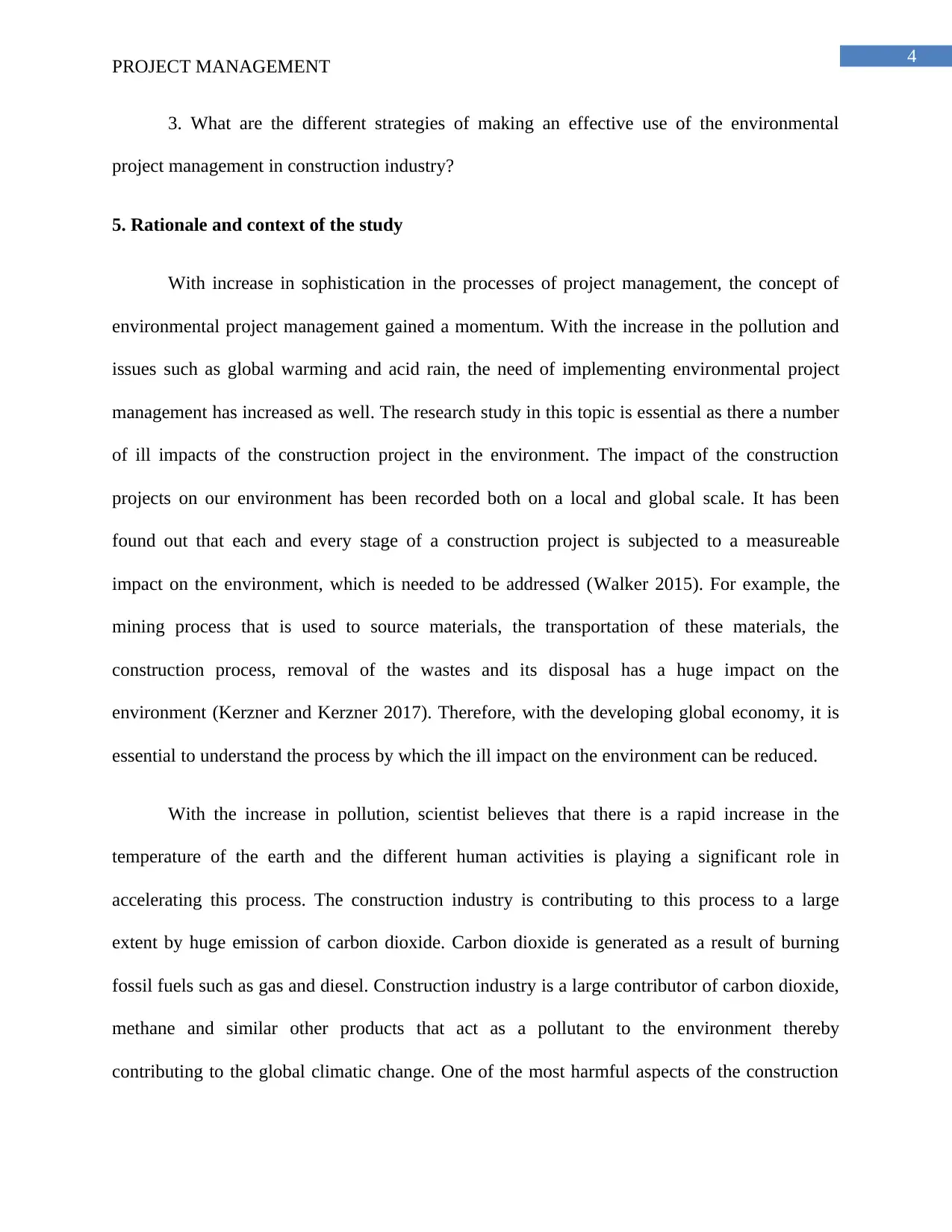
4
PROJECT MANAGEMENT
3. What are the different strategies of making an effective use of the environmental
project management in construction industry?
5. Rationale and context of the study
With increase in sophistication in the processes of project management, the concept of
environmental project management gained a momentum. With the increase in the pollution and
issues such as global warming and acid rain, the need of implementing environmental project
management has increased as well. The research study in this topic is essential as there a number
of ill impacts of the construction project in the environment. The impact of the construction
projects on our environment has been recorded both on a local and global scale. It has been
found out that each and every stage of a construction project is subjected to a measureable
impact on the environment, which is needed to be addressed (Walker 2015). For example, the
mining process that is used to source materials, the transportation of these materials, the
construction process, removal of the wastes and its disposal has a huge impact on the
environment (Kerzner and Kerzner 2017). Therefore, with the developing global economy, it is
essential to understand the process by which the ill impact on the environment can be reduced.
With the increase in pollution, scientist believes that there is a rapid increase in the
temperature of the earth and the different human activities is playing a significant role in
accelerating this process. The construction industry is contributing to this process to a large
extent by huge emission of carbon dioxide. Carbon dioxide is generated as a result of burning
fossil fuels such as gas and diesel. Construction industry is a large contributor of carbon dioxide,
methane and similar other products that act as a pollutant to the environment thereby
contributing to the global climatic change. One of the most harmful aspects of the construction
PROJECT MANAGEMENT
3. What are the different strategies of making an effective use of the environmental
project management in construction industry?
5. Rationale and context of the study
With increase in sophistication in the processes of project management, the concept of
environmental project management gained a momentum. With the increase in the pollution and
issues such as global warming and acid rain, the need of implementing environmental project
management has increased as well. The research study in this topic is essential as there a number
of ill impacts of the construction project in the environment. The impact of the construction
projects on our environment has been recorded both on a local and global scale. It has been
found out that each and every stage of a construction project is subjected to a measureable
impact on the environment, which is needed to be addressed (Walker 2015). For example, the
mining process that is used to source materials, the transportation of these materials, the
construction process, removal of the wastes and its disposal has a huge impact on the
environment (Kerzner and Kerzner 2017). Therefore, with the developing global economy, it is
essential to understand the process by which the ill impact on the environment can be reduced.
With the increase in pollution, scientist believes that there is a rapid increase in the
temperature of the earth and the different human activities is playing a significant role in
accelerating this process. The construction industry is contributing to this process to a large
extent by huge emission of carbon dioxide. Carbon dioxide is generated as a result of burning
fossil fuels such as gas and diesel. Construction industry is a large contributor of carbon dioxide,
methane and similar other products that act as a pollutant to the environment thereby
contributing to the global climatic change. One of the most harmful aspects of the construction
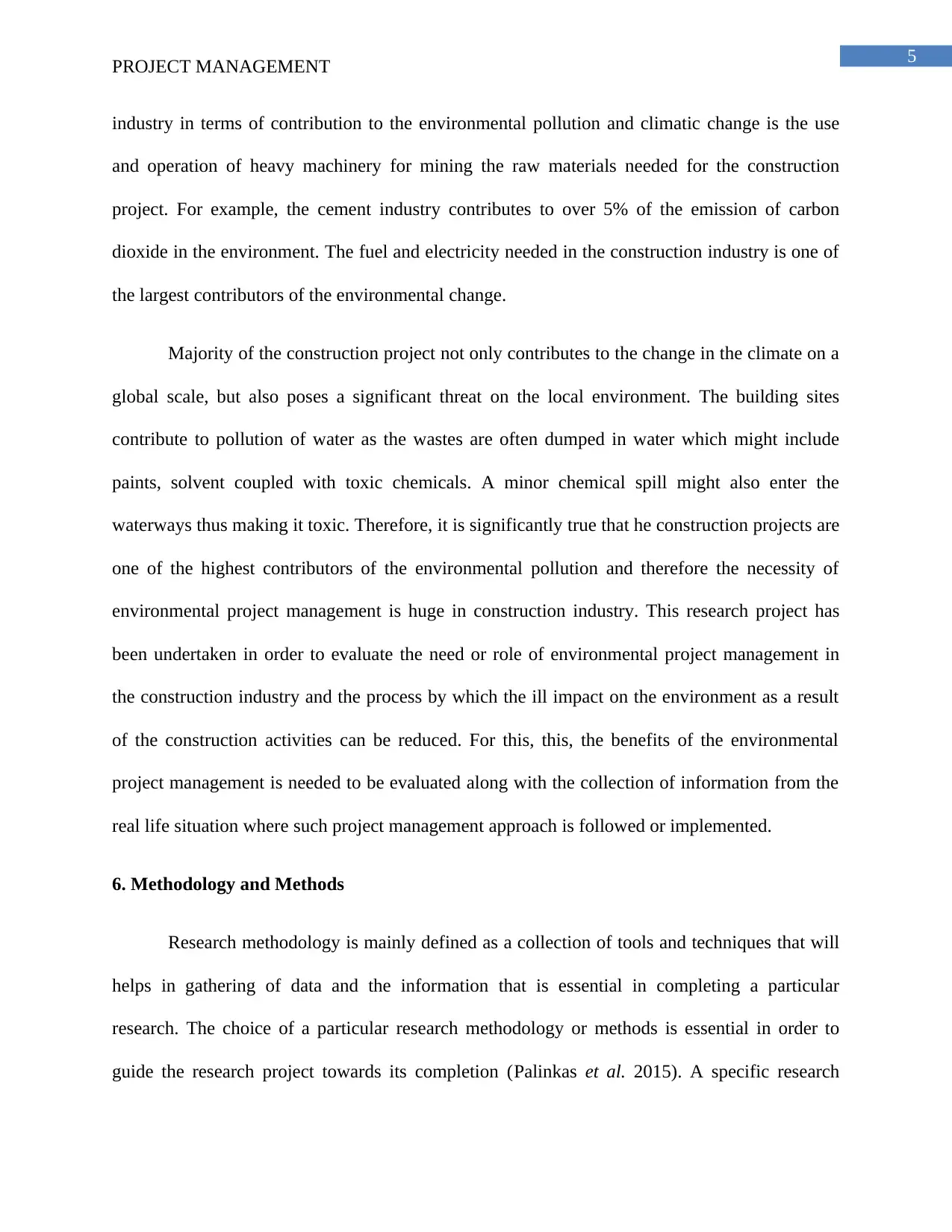
5
PROJECT MANAGEMENT
industry in terms of contribution to the environmental pollution and climatic change is the use
and operation of heavy machinery for mining the raw materials needed for the construction
project. For example, the cement industry contributes to over 5% of the emission of carbon
dioxide in the environment. The fuel and electricity needed in the construction industry is one of
the largest contributors of the environmental change.
Majority of the construction project not only contributes to the change in the climate on a
global scale, but also poses a significant threat on the local environment. The building sites
contribute to pollution of water as the wastes are often dumped in water which might include
paints, solvent coupled with toxic chemicals. A minor chemical spill might also enter the
waterways thus making it toxic. Therefore, it is significantly true that he construction projects are
one of the highest contributors of the environmental pollution and therefore the necessity of
environmental project management is huge in construction industry. This research project has
been undertaken in order to evaluate the need or role of environmental project management in
the construction industry and the process by which the ill impact on the environment as a result
of the construction activities can be reduced. For this, this, the benefits of the environmental
project management is needed to be evaluated along with the collection of information from the
real life situation where such project management approach is followed or implemented.
6. Methodology and Methods
Research methodology is mainly defined as a collection of tools and techniques that will
helps in gathering of data and the information that is essential in completing a particular
research. The choice of a particular research methodology or methods is essential in order to
guide the research project towards its completion (Palinkas et al. 2015). A specific research
PROJECT MANAGEMENT
industry in terms of contribution to the environmental pollution and climatic change is the use
and operation of heavy machinery for mining the raw materials needed for the construction
project. For example, the cement industry contributes to over 5% of the emission of carbon
dioxide in the environment. The fuel and electricity needed in the construction industry is one of
the largest contributors of the environmental change.
Majority of the construction project not only contributes to the change in the climate on a
global scale, but also poses a significant threat on the local environment. The building sites
contribute to pollution of water as the wastes are often dumped in water which might include
paints, solvent coupled with toxic chemicals. A minor chemical spill might also enter the
waterways thus making it toxic. Therefore, it is significantly true that he construction projects are
one of the highest contributors of the environmental pollution and therefore the necessity of
environmental project management is huge in construction industry. This research project has
been undertaken in order to evaluate the need or role of environmental project management in
the construction industry and the process by which the ill impact on the environment as a result
of the construction activities can be reduced. For this, this, the benefits of the environmental
project management is needed to be evaluated along with the collection of information from the
real life situation where such project management approach is followed or implemented.
6. Methodology and Methods
Research methodology is mainly defined as a collection of tools and techniques that will
helps in gathering of data and the information that is essential in completing a particular
research. The choice of a particular research methodology or methods is essential in order to
guide the research project towards its completion (Palinkas et al. 2015). A specific research
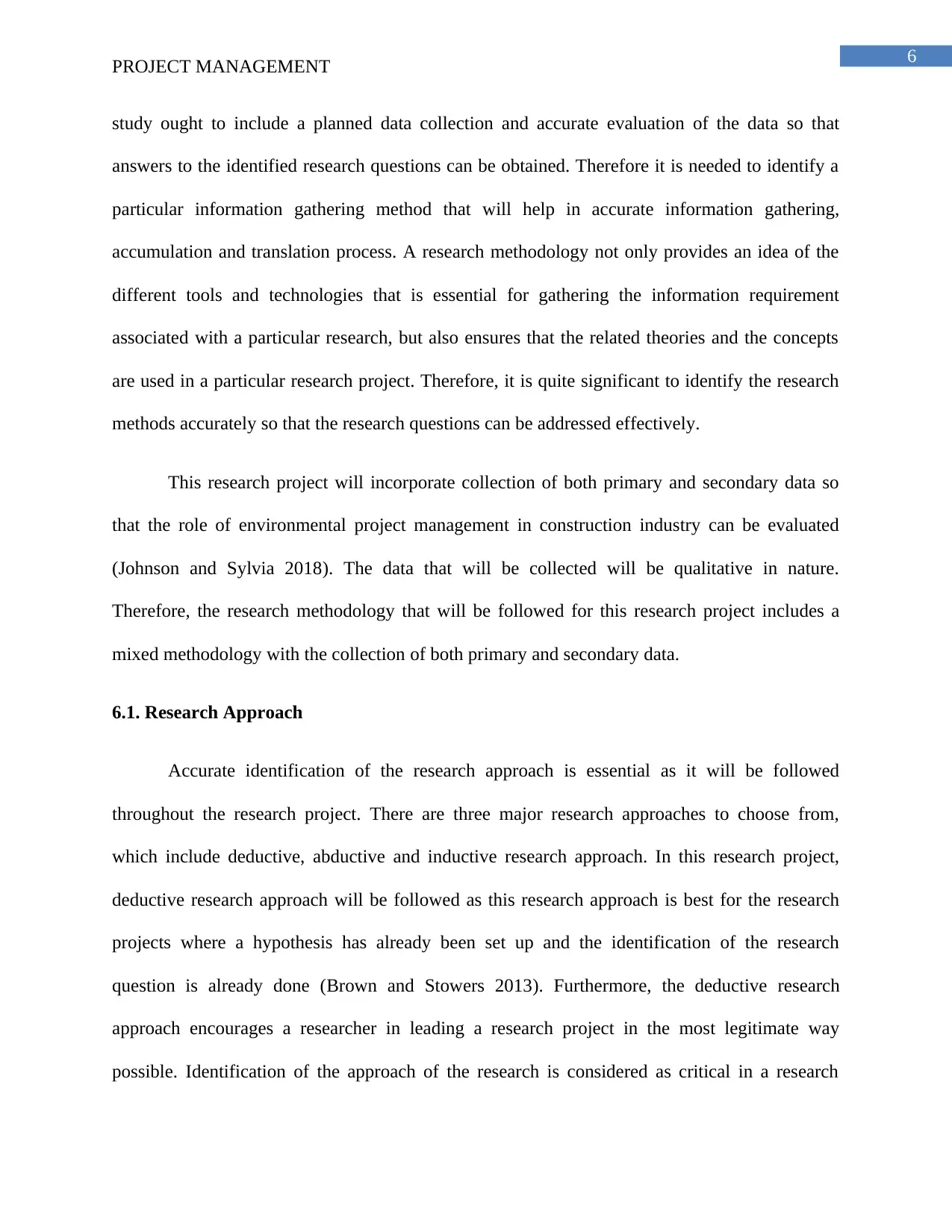
6
PROJECT MANAGEMENT
study ought to include a planned data collection and accurate evaluation of the data so that
answers to the identified research questions can be obtained. Therefore it is needed to identify a
particular information gathering method that will help in accurate information gathering,
accumulation and translation process. A research methodology not only provides an idea of the
different tools and technologies that is essential for gathering the information requirement
associated with a particular research, but also ensures that the related theories and the concepts
are used in a particular research project. Therefore, it is quite significant to identify the research
methods accurately so that the research questions can be addressed effectively.
This research project will incorporate collection of both primary and secondary data so
that the role of environmental project management in construction industry can be evaluated
(Johnson and Sylvia 2018). The data that will be collected will be qualitative in nature.
Therefore, the research methodology that will be followed for this research project includes a
mixed methodology with the collection of both primary and secondary data.
6.1. Research Approach
Accurate identification of the research approach is essential as it will be followed
throughout the research project. There are three major research approaches to choose from,
which include deductive, abductive and inductive research approach. In this research project,
deductive research approach will be followed as this research approach is best for the research
projects where a hypothesis has already been set up and the identification of the research
question is already done (Brown and Stowers 2013). Furthermore, the deductive research
approach encourages a researcher in leading a research project in the most legitimate way
possible. Identification of the approach of the research is considered as critical in a research
PROJECT MANAGEMENT
study ought to include a planned data collection and accurate evaluation of the data so that
answers to the identified research questions can be obtained. Therefore it is needed to identify a
particular information gathering method that will help in accurate information gathering,
accumulation and translation process. A research methodology not only provides an idea of the
different tools and technologies that is essential for gathering the information requirement
associated with a particular research, but also ensures that the related theories and the concepts
are used in a particular research project. Therefore, it is quite significant to identify the research
methods accurately so that the research questions can be addressed effectively.
This research project will incorporate collection of both primary and secondary data so
that the role of environmental project management in construction industry can be evaluated
(Johnson and Sylvia 2018). The data that will be collected will be qualitative in nature.
Therefore, the research methodology that will be followed for this research project includes a
mixed methodology with the collection of both primary and secondary data.
6.1. Research Approach
Accurate identification of the research approach is essential as it will be followed
throughout the research project. There are three major research approaches to choose from,
which include deductive, abductive and inductive research approach. In this research project,
deductive research approach will be followed as this research approach is best for the research
projects where a hypothesis has already been set up and the identification of the research
question is already done (Brown and Stowers 2013). Furthermore, the deductive research
approach encourages a researcher in leading a research project in the most legitimate way
possible. Identification of the approach of the research is considered as critical in a research
Paraphrase This Document
Need a fresh take? Get an instant paraphrase of this document with our AI Paraphraser
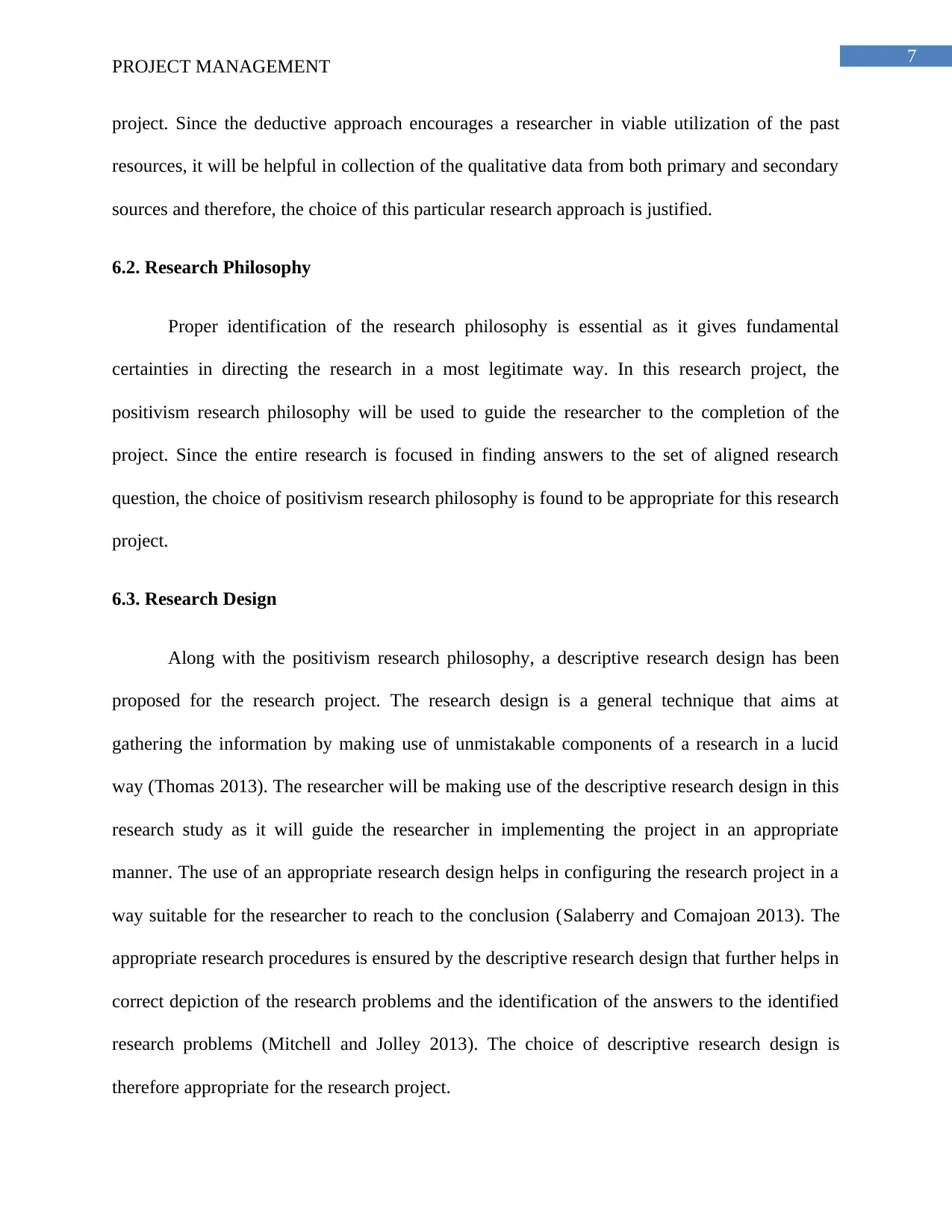
7
PROJECT MANAGEMENT
project. Since the deductive approach encourages a researcher in viable utilization of the past
resources, it will be helpful in collection of the qualitative data from both primary and secondary
sources and therefore, the choice of this particular research approach is justified.
6.2. Research Philosophy
Proper identification of the research philosophy is essential as it gives fundamental
certainties in directing the research in a most legitimate way. In this research project, the
positivism research philosophy will be used to guide the researcher to the completion of the
project. Since the entire research is focused in finding answers to the set of aligned research
question, the choice of positivism research philosophy is found to be appropriate for this research
project.
6.3. Research Design
Along with the positivism research philosophy, a descriptive research design has been
proposed for the research project. The research design is a general technique that aims at
gathering the information by making use of unmistakable components of a research in a lucid
way (Thomas 2013). The researcher will be making use of the descriptive research design in this
research study as it will guide the researcher in implementing the project in an appropriate
manner. The use of an appropriate research design helps in configuring the research project in a
way suitable for the researcher to reach to the conclusion (Salaberry and Comajoan 2013). The
appropriate research procedures is ensured by the descriptive research design that further helps in
correct depiction of the research problems and the identification of the answers to the identified
research problems (Mitchell and Jolley 2013). The choice of descriptive research design is
therefore appropriate for the research project.
PROJECT MANAGEMENT
project. Since the deductive approach encourages a researcher in viable utilization of the past
resources, it will be helpful in collection of the qualitative data from both primary and secondary
sources and therefore, the choice of this particular research approach is justified.
6.2. Research Philosophy
Proper identification of the research philosophy is essential as it gives fundamental
certainties in directing the research in a most legitimate way. In this research project, the
positivism research philosophy will be used to guide the researcher to the completion of the
project. Since the entire research is focused in finding answers to the set of aligned research
question, the choice of positivism research philosophy is found to be appropriate for this research
project.
6.3. Research Design
Along with the positivism research philosophy, a descriptive research design has been
proposed for the research project. The research design is a general technique that aims at
gathering the information by making use of unmistakable components of a research in a lucid
way (Thomas 2013). The researcher will be making use of the descriptive research design in this
research study as it will guide the researcher in implementing the project in an appropriate
manner. The use of an appropriate research design helps in configuring the research project in a
way suitable for the researcher to reach to the conclusion (Salaberry and Comajoan 2013). The
appropriate research procedures is ensured by the descriptive research design that further helps in
correct depiction of the research problems and the identification of the answers to the identified
research problems (Mitchell and Jolley 2013). The choice of descriptive research design is
therefore appropriate for the research project.
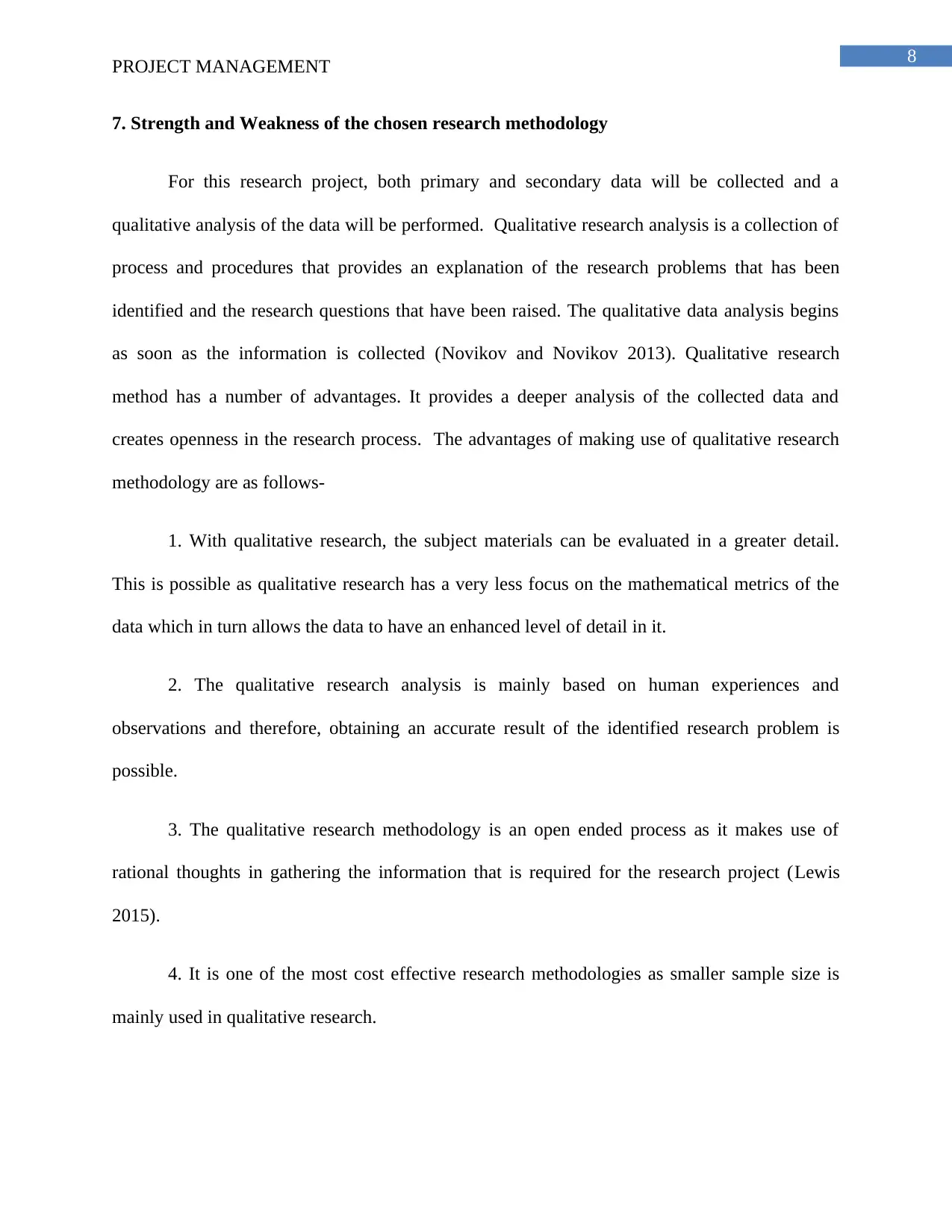
8
PROJECT MANAGEMENT
7. Strength and Weakness of the chosen research methodology
For this research project, both primary and secondary data will be collected and a
qualitative analysis of the data will be performed. Qualitative research analysis is a collection of
process and procedures that provides an explanation of the research problems that has been
identified and the research questions that have been raised. The qualitative data analysis begins
as soon as the information is collected (Novikov and Novikov 2013). Qualitative research
method has a number of advantages. It provides a deeper analysis of the collected data and
creates openness in the research process. The advantages of making use of qualitative research
methodology are as follows-
1. With qualitative research, the subject materials can be evaluated in a greater detail.
This is possible as qualitative research has a very less focus on the mathematical metrics of the
data which in turn allows the data to have an enhanced level of detail in it.
2. The qualitative research analysis is mainly based on human experiences and
observations and therefore, obtaining an accurate result of the identified research problem is
possible.
3. The qualitative research methodology is an open ended process as it makes use of
rational thoughts in gathering the information that is required for the research project (Lewis
2015).
4. It is one of the most cost effective research methodologies as smaller sample size is
mainly used in qualitative research.
PROJECT MANAGEMENT
7. Strength and Weakness of the chosen research methodology
For this research project, both primary and secondary data will be collected and a
qualitative analysis of the data will be performed. Qualitative research analysis is a collection of
process and procedures that provides an explanation of the research problems that has been
identified and the research questions that have been raised. The qualitative data analysis begins
as soon as the information is collected (Novikov and Novikov 2013). Qualitative research
method has a number of advantages. It provides a deeper analysis of the collected data and
creates openness in the research process. The advantages of making use of qualitative research
methodology are as follows-
1. With qualitative research, the subject materials can be evaluated in a greater detail.
This is possible as qualitative research has a very less focus on the mathematical metrics of the
data which in turn allows the data to have an enhanced level of detail in it.
2. The qualitative research analysis is mainly based on human experiences and
observations and therefore, obtaining an accurate result of the identified research problem is
possible.
3. The qualitative research methodology is an open ended process as it makes use of
rational thoughts in gathering the information that is required for the research project (Lewis
2015).
4. It is one of the most cost effective research methodologies as smaller sample size is
mainly used in qualitative research.
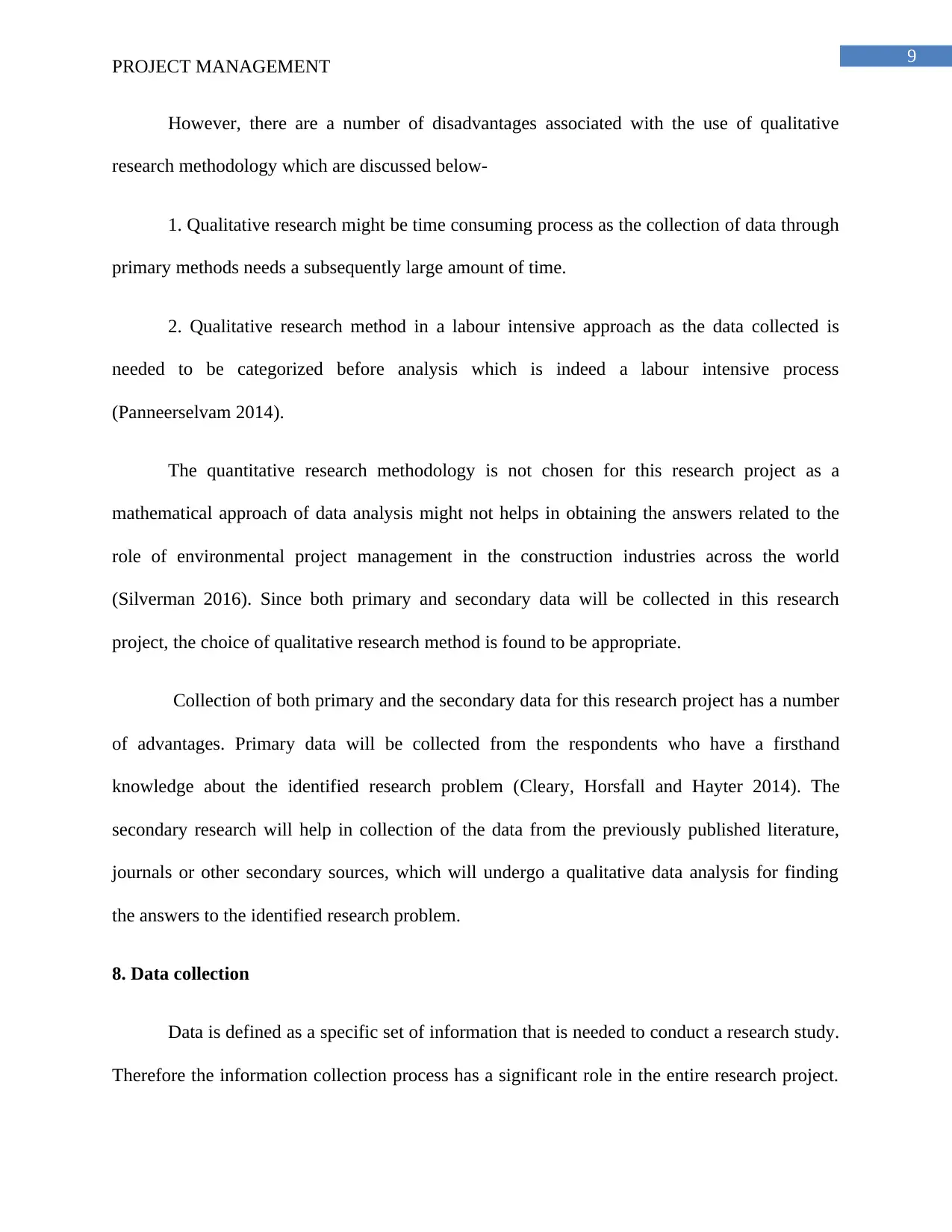
9
PROJECT MANAGEMENT
However, there are a number of disadvantages associated with the use of qualitative
research methodology which are discussed below-
1. Qualitative research might be time consuming process as the collection of data through
primary methods needs a subsequently large amount of time.
2. Qualitative research method in a labour intensive approach as the data collected is
needed to be categorized before analysis which is indeed a labour intensive process
(Panneerselvam 2014).
The quantitative research methodology is not chosen for this research project as a
mathematical approach of data analysis might not helps in obtaining the answers related to the
role of environmental project management in the construction industries across the world
(Silverman 2016). Since both primary and secondary data will be collected in this research
project, the choice of qualitative research method is found to be appropriate.
Collection of both primary and the secondary data for this research project has a number
of advantages. Primary data will be collected from the respondents who have a firsthand
knowledge about the identified research problem (Cleary, Horsfall and Hayter 2014). The
secondary research will help in collection of the data from the previously published literature,
journals or other secondary sources, which will undergo a qualitative data analysis for finding
the answers to the identified research problem.
8. Data collection
Data is defined as a specific set of information that is needed to conduct a research study.
Therefore the information collection process has a significant role in the entire research project.
PROJECT MANAGEMENT
However, there are a number of disadvantages associated with the use of qualitative
research methodology which are discussed below-
1. Qualitative research might be time consuming process as the collection of data through
primary methods needs a subsequently large amount of time.
2. Qualitative research method in a labour intensive approach as the data collected is
needed to be categorized before analysis which is indeed a labour intensive process
(Panneerselvam 2014).
The quantitative research methodology is not chosen for this research project as a
mathematical approach of data analysis might not helps in obtaining the answers related to the
role of environmental project management in the construction industries across the world
(Silverman 2016). Since both primary and secondary data will be collected in this research
project, the choice of qualitative research method is found to be appropriate.
Collection of both primary and the secondary data for this research project has a number
of advantages. Primary data will be collected from the respondents who have a firsthand
knowledge about the identified research problem (Cleary, Horsfall and Hayter 2014). The
secondary research will help in collection of the data from the previously published literature,
journals or other secondary sources, which will undergo a qualitative data analysis for finding
the answers to the identified research problem.
8. Data collection
Data is defined as a specific set of information that is needed to conduct a research study.
Therefore the information collection process has a significant role in the entire research project.
Secure Best Marks with AI Grader
Need help grading? Try our AI Grader for instant feedback on your assignments.
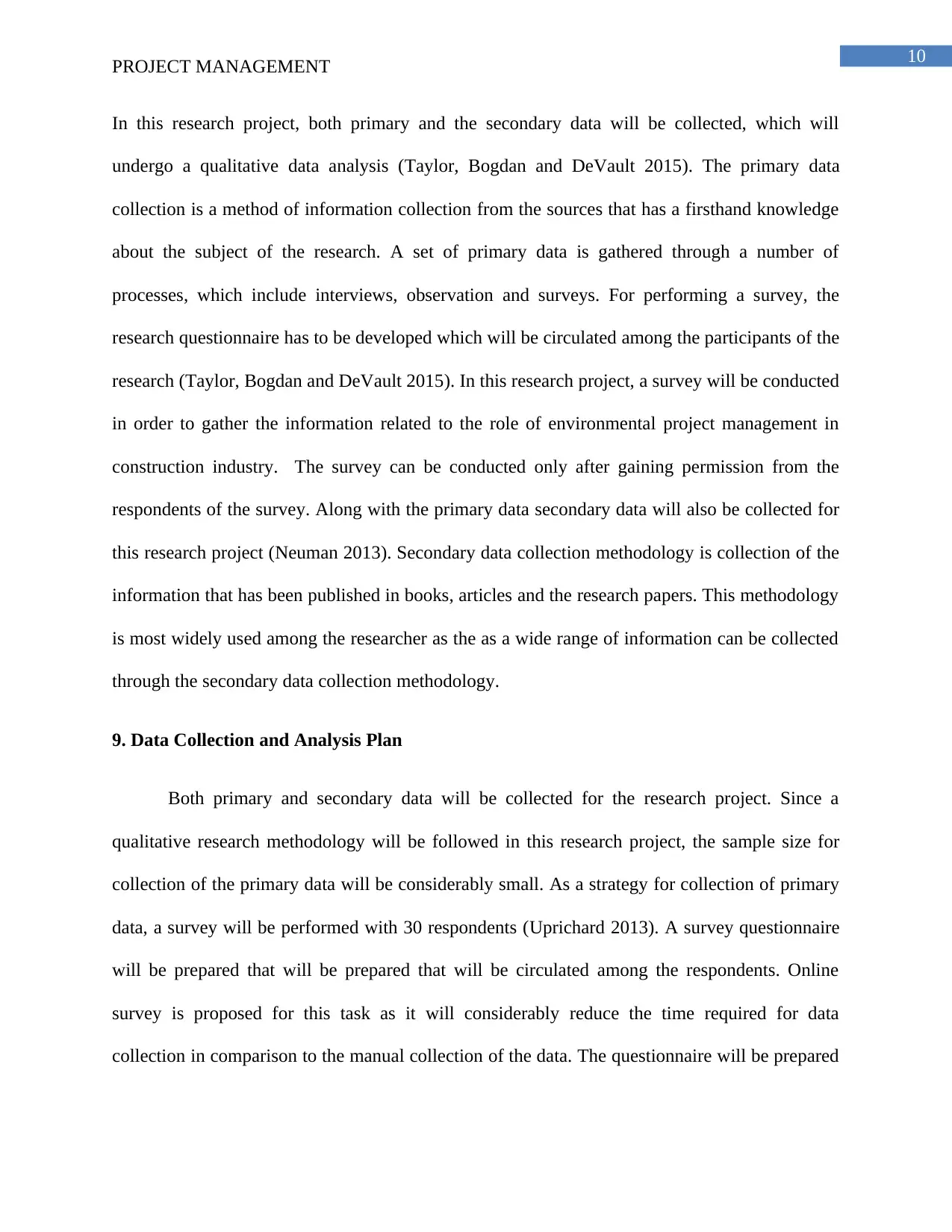
10
PROJECT MANAGEMENT
In this research project, both primary and the secondary data will be collected, which will
undergo a qualitative data analysis (Taylor, Bogdan and DeVault 2015). The primary data
collection is a method of information collection from the sources that has a firsthand knowledge
about the subject of the research. A set of primary data is gathered through a number of
processes, which include interviews, observation and surveys. For performing a survey, the
research questionnaire has to be developed which will be circulated among the participants of the
research (Taylor, Bogdan and DeVault 2015). In this research project, a survey will be conducted
in order to gather the information related to the role of environmental project management in
construction industry. The survey can be conducted only after gaining permission from the
respondents of the survey. Along with the primary data secondary data will also be collected for
this research project (Neuman 2013). Secondary data collection methodology is collection of the
information that has been published in books, articles and the research papers. This methodology
is most widely used among the researcher as the as a wide range of information can be collected
through the secondary data collection methodology.
9. Data Collection and Analysis Plan
Both primary and secondary data will be collected for the research project. Since a
qualitative research methodology will be followed in this research project, the sample size for
collection of the primary data will be considerably small. As a strategy for collection of primary
data, a survey will be performed with 30 respondents (Uprichard 2013). A survey questionnaire
will be prepared that will be prepared that will be circulated among the respondents. Online
survey is proposed for this task as it will considerably reduce the time required for data
collection in comparison to the manual collection of the data. The questionnaire will be prepared
PROJECT MANAGEMENT
In this research project, both primary and the secondary data will be collected, which will
undergo a qualitative data analysis (Taylor, Bogdan and DeVault 2015). The primary data
collection is a method of information collection from the sources that has a firsthand knowledge
about the subject of the research. A set of primary data is gathered through a number of
processes, which include interviews, observation and surveys. For performing a survey, the
research questionnaire has to be developed which will be circulated among the participants of the
research (Taylor, Bogdan and DeVault 2015). In this research project, a survey will be conducted
in order to gather the information related to the role of environmental project management in
construction industry. The survey can be conducted only after gaining permission from the
respondents of the survey. Along with the primary data secondary data will also be collected for
this research project (Neuman 2013). Secondary data collection methodology is collection of the
information that has been published in books, articles and the research papers. This methodology
is most widely used among the researcher as the as a wide range of information can be collected
through the secondary data collection methodology.
9. Data Collection and Analysis Plan
Both primary and secondary data will be collected for the research project. Since a
qualitative research methodology will be followed in this research project, the sample size for
collection of the primary data will be considerably small. As a strategy for collection of primary
data, a survey will be performed with 30 respondents (Uprichard 2013). A survey questionnaire
will be prepared that will be prepared that will be circulated among the respondents. Online
survey is proposed for this task as it will considerably reduce the time required for data
collection in comparison to the manual collection of the data. The questionnaire will be prepared
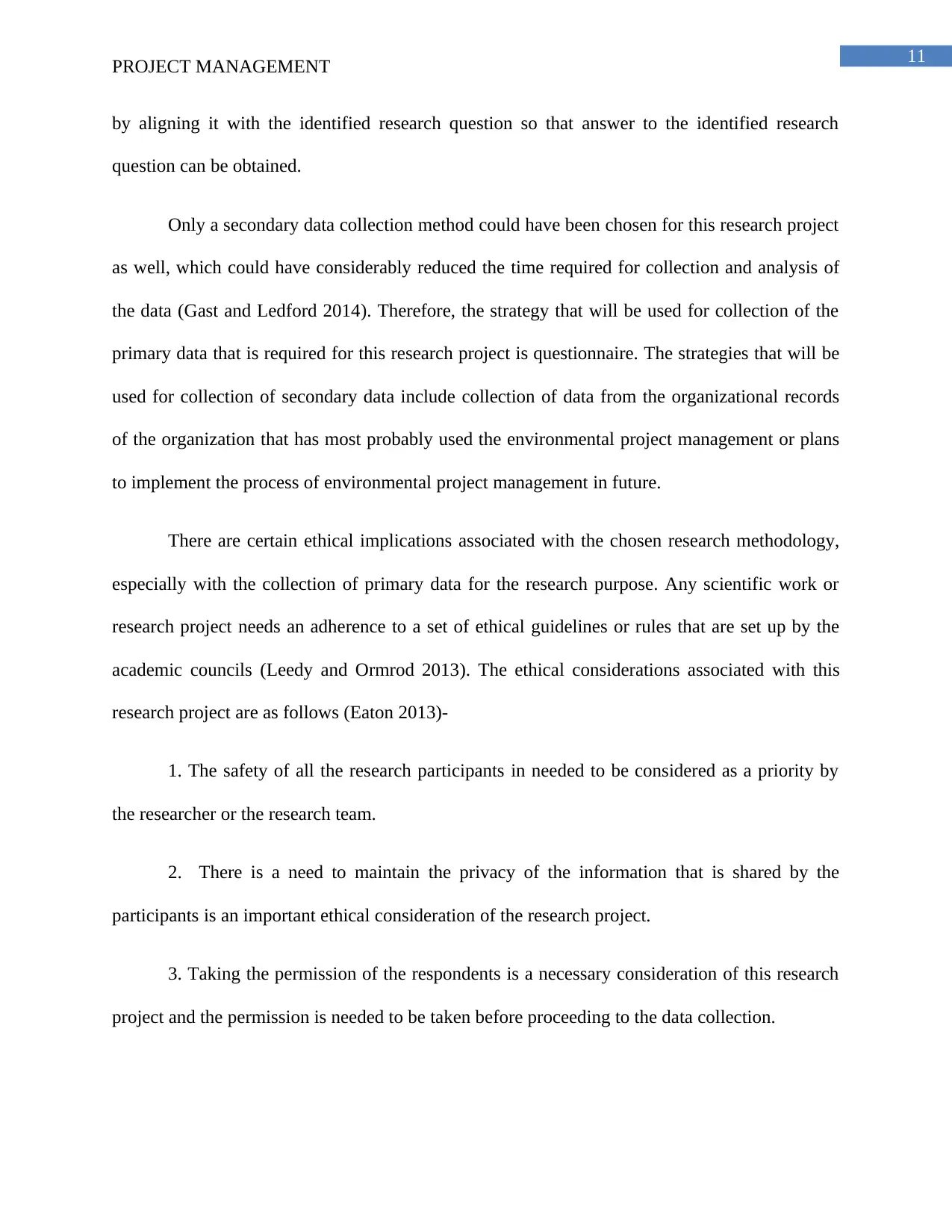
11
PROJECT MANAGEMENT
by aligning it with the identified research question so that answer to the identified research
question can be obtained.
Only a secondary data collection method could have been chosen for this research project
as well, which could have considerably reduced the time required for collection and analysis of
the data (Gast and Ledford 2014). Therefore, the strategy that will be used for collection of the
primary data that is required for this research project is questionnaire. The strategies that will be
used for collection of secondary data include collection of data from the organizational records
of the organization that has most probably used the environmental project management or plans
to implement the process of environmental project management in future.
There are certain ethical implications associated with the chosen research methodology,
especially with the collection of primary data for the research purpose. Any scientific work or
research project needs an adherence to a set of ethical guidelines or rules that are set up by the
academic councils (Leedy and Ormrod 2013). The ethical considerations associated with this
research project are as follows (Eaton 2013)-
1. The safety of all the research participants in needed to be considered as a priority by
the researcher or the research team.
2. There is a need to maintain the privacy of the information that is shared by the
participants is an important ethical consideration of the research project.
3. Taking the permission of the respondents is a necessary consideration of this research
project and the permission is needed to be taken before proceeding to the data collection.
PROJECT MANAGEMENT
by aligning it with the identified research question so that answer to the identified research
question can be obtained.
Only a secondary data collection method could have been chosen for this research project
as well, which could have considerably reduced the time required for collection and analysis of
the data (Gast and Ledford 2014). Therefore, the strategy that will be used for collection of the
primary data that is required for this research project is questionnaire. The strategies that will be
used for collection of secondary data include collection of data from the organizational records
of the organization that has most probably used the environmental project management or plans
to implement the process of environmental project management in future.
There are certain ethical implications associated with the chosen research methodology,
especially with the collection of primary data for the research purpose. Any scientific work or
research project needs an adherence to a set of ethical guidelines or rules that are set up by the
academic councils (Leedy and Ormrod 2013). The ethical considerations associated with this
research project are as follows (Eaton 2013)-
1. The safety of all the research participants in needed to be considered as a priority by
the researcher or the research team.
2. There is a need to maintain the privacy of the information that is shared by the
participants is an important ethical consideration of the research project.
3. Taking the permission of the respondents is a necessary consideration of this research
project and the permission is needed to be taken before proceeding to the data collection.
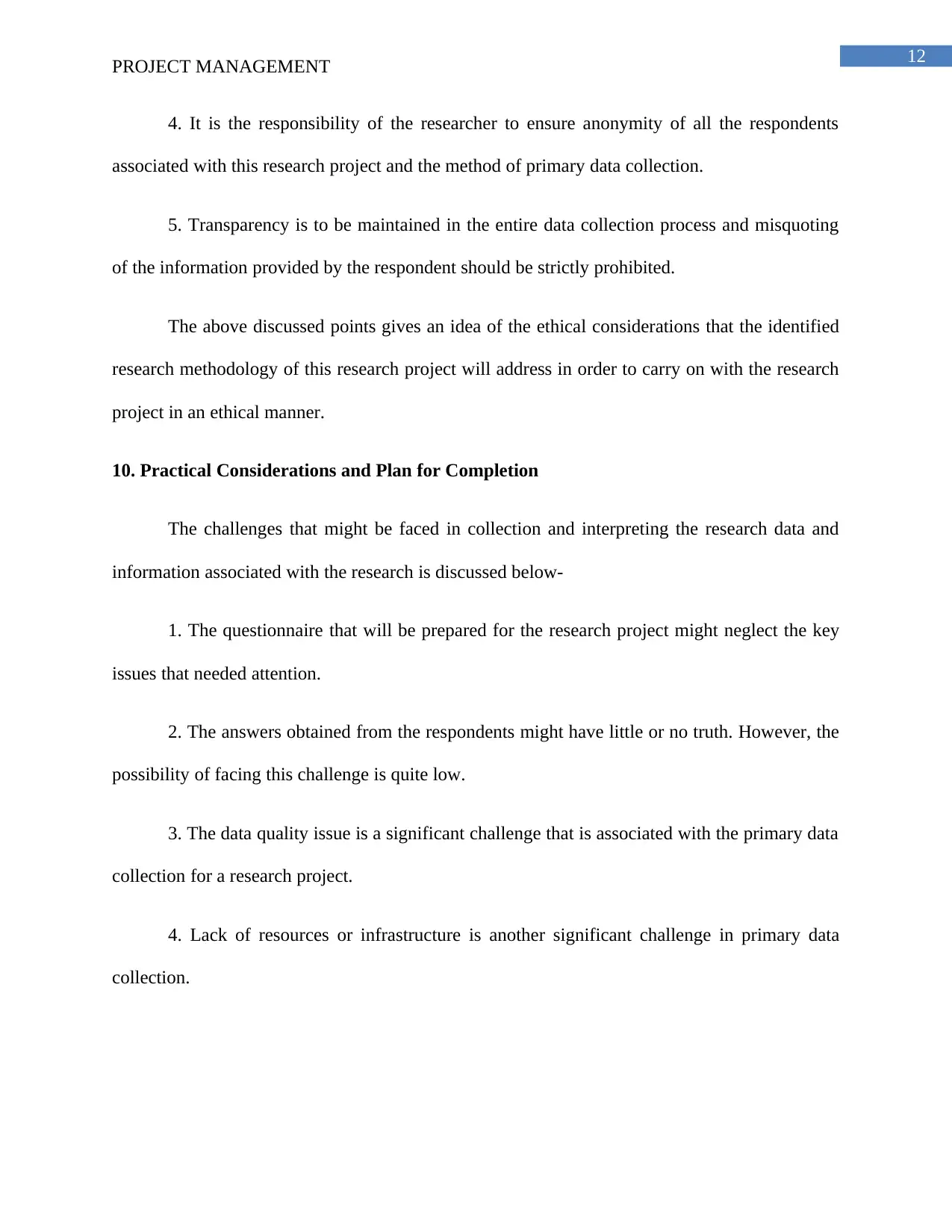
12
PROJECT MANAGEMENT
4. It is the responsibility of the researcher to ensure anonymity of all the respondents
associated with this research project and the method of primary data collection.
5. Transparency is to be maintained in the entire data collection process and misquoting
of the information provided by the respondent should be strictly prohibited.
The above discussed points gives an idea of the ethical considerations that the identified
research methodology of this research project will address in order to carry on with the research
project in an ethical manner.
10. Practical Considerations and Plan for Completion
The challenges that might be faced in collection and interpreting the research data and
information associated with the research is discussed below-
1. The questionnaire that will be prepared for the research project might neglect the key
issues that needed attention.
2. The answers obtained from the respondents might have little or no truth. However, the
possibility of facing this challenge is quite low.
3. The data quality issue is a significant challenge that is associated with the primary data
collection for a research project.
4. Lack of resources or infrastructure is another significant challenge in primary data
collection.
PROJECT MANAGEMENT
4. It is the responsibility of the researcher to ensure anonymity of all the respondents
associated with this research project and the method of primary data collection.
5. Transparency is to be maintained in the entire data collection process and misquoting
of the information provided by the respondent should be strictly prohibited.
The above discussed points gives an idea of the ethical considerations that the identified
research methodology of this research project will address in order to carry on with the research
project in an ethical manner.
10. Practical Considerations and Plan for Completion
The challenges that might be faced in collection and interpreting the research data and
information associated with the research is discussed below-
1. The questionnaire that will be prepared for the research project might neglect the key
issues that needed attention.
2. The answers obtained from the respondents might have little or no truth. However, the
possibility of facing this challenge is quite low.
3. The data quality issue is a significant challenge that is associated with the primary data
collection for a research project.
4. Lack of resources or infrastructure is another significant challenge in primary data
collection.
Paraphrase This Document
Need a fresh take? Get an instant paraphrase of this document with our AI Paraphraser
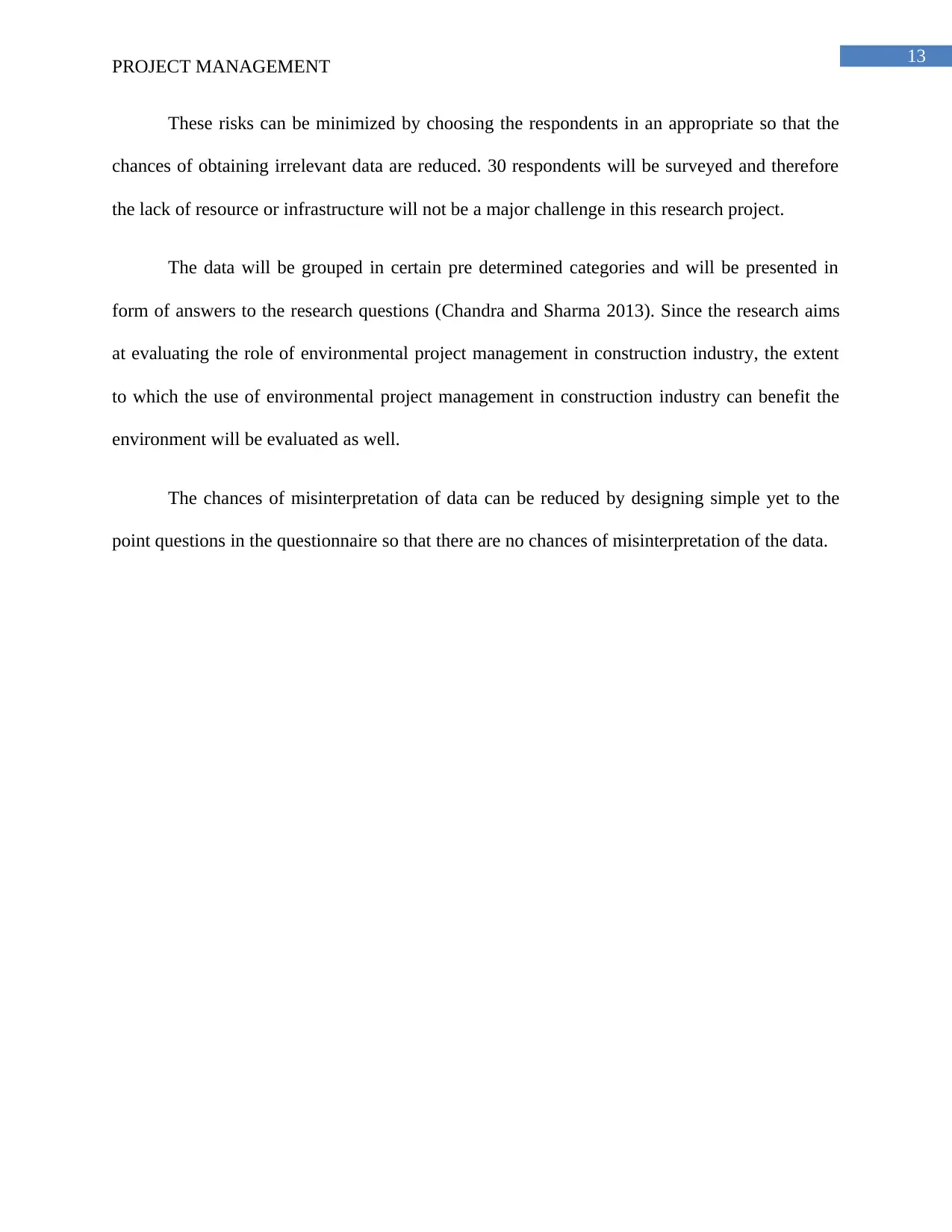
13
PROJECT MANAGEMENT
These risks can be minimized by choosing the respondents in an appropriate so that the
chances of obtaining irrelevant data are reduced. 30 respondents will be surveyed and therefore
the lack of resource or infrastructure will not be a major challenge in this research project.
The data will be grouped in certain pre determined categories and will be presented in
form of answers to the research questions (Chandra and Sharma 2013). Since the research aims
at evaluating the role of environmental project management in construction industry, the extent
to which the use of environmental project management in construction industry can benefit the
environment will be evaluated as well.
The chances of misinterpretation of data can be reduced by designing simple yet to the
point questions in the questionnaire so that there are no chances of misinterpretation of the data.
PROJECT MANAGEMENT
These risks can be minimized by choosing the respondents in an appropriate so that the
chances of obtaining irrelevant data are reduced. 30 respondents will be surveyed and therefore
the lack of resource or infrastructure will not be a major challenge in this research project.
The data will be grouped in certain pre determined categories and will be presented in
form of answers to the research questions (Chandra and Sharma 2013). Since the research aims
at evaluating the role of environmental project management in construction industry, the extent
to which the use of environmental project management in construction industry can benefit the
environment will be evaluated as well.
The chances of misinterpretation of data can be reduced by designing simple yet to the
point questions in the questionnaire so that there are no chances of misinterpretation of the data.
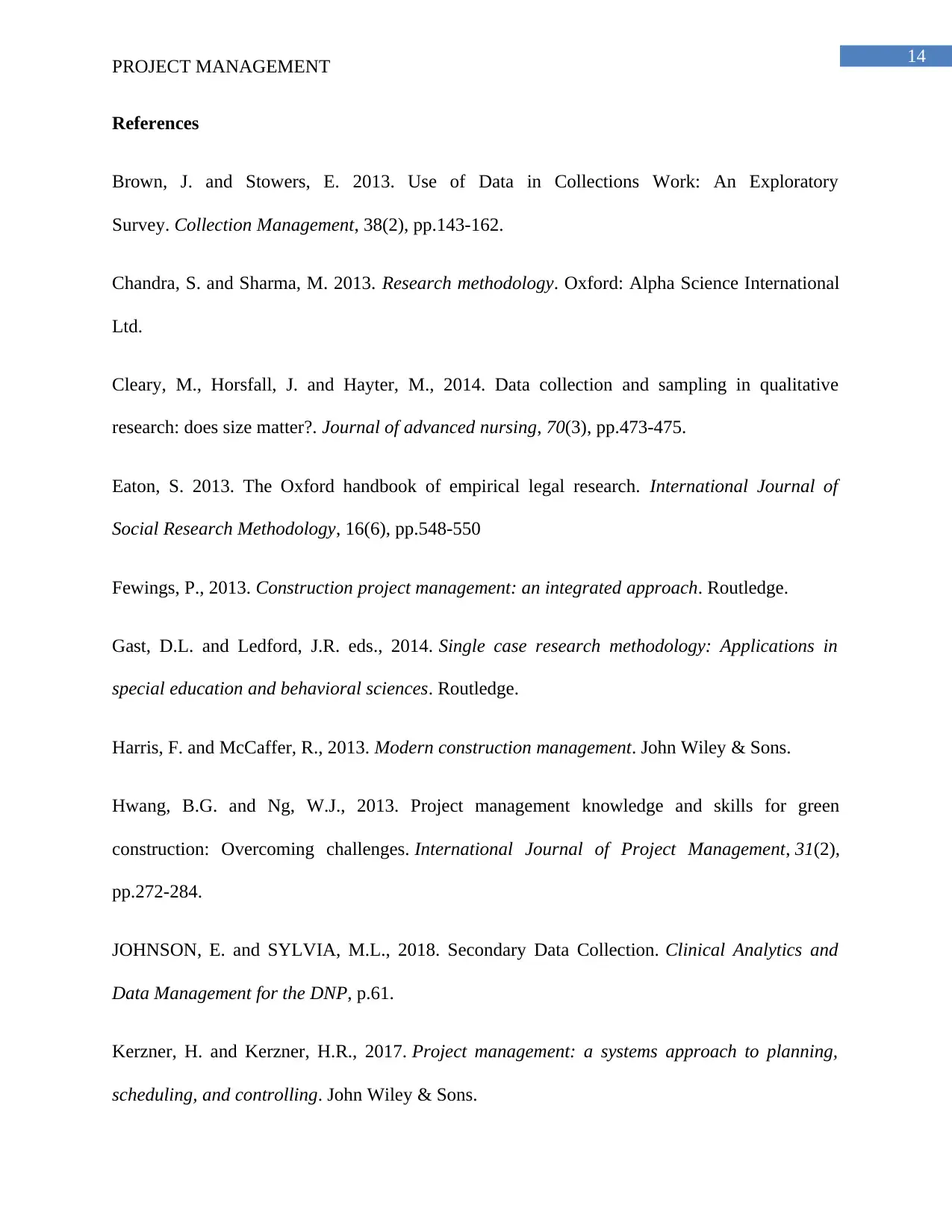
14
PROJECT MANAGEMENT
References
Brown, J. and Stowers, E. 2013. Use of Data in Collections Work: An Exploratory
Survey. Collection Management, 38(2), pp.143-162.
Chandra, S. and Sharma, M. 2013. Research methodology. Oxford: Alpha Science International
Ltd.
Cleary, M., Horsfall, J. and Hayter, M., 2014. Data collection and sampling in qualitative
research: does size matter?. Journal of advanced nursing, 70(3), pp.473-475.
Eaton, S. 2013. The Oxford handbook of empirical legal research. International Journal of
Social Research Methodology, 16(6), pp.548-550
Fewings, P., 2013. Construction project management: an integrated approach. Routledge.
Gast, D.L. and Ledford, J.R. eds., 2014. Single case research methodology: Applications in
special education and behavioral sciences. Routledge.
Harris, F. and McCaffer, R., 2013. Modern construction management. John Wiley & Sons.
Hwang, B.G. and Ng, W.J., 2013. Project management knowledge and skills for green
construction: Overcoming challenges. International Journal of Project Management, 31(2),
pp.272-284.
JOHNSON, E. and SYLVIA, M.L., 2018. Secondary Data Collection. Clinical Analytics and
Data Management for the DNP, p.61.
Kerzner, H. and Kerzner, H.R., 2017. Project management: a systems approach to planning,
scheduling, and controlling. John Wiley & Sons.
PROJECT MANAGEMENT
References
Brown, J. and Stowers, E. 2013. Use of Data in Collections Work: An Exploratory
Survey. Collection Management, 38(2), pp.143-162.
Chandra, S. and Sharma, M. 2013. Research methodology. Oxford: Alpha Science International
Ltd.
Cleary, M., Horsfall, J. and Hayter, M., 2014. Data collection and sampling in qualitative
research: does size matter?. Journal of advanced nursing, 70(3), pp.473-475.
Eaton, S. 2013. The Oxford handbook of empirical legal research. International Journal of
Social Research Methodology, 16(6), pp.548-550
Fewings, P., 2013. Construction project management: an integrated approach. Routledge.
Gast, D.L. and Ledford, J.R. eds., 2014. Single case research methodology: Applications in
special education and behavioral sciences. Routledge.
Harris, F. and McCaffer, R., 2013. Modern construction management. John Wiley & Sons.
Hwang, B.G. and Ng, W.J., 2013. Project management knowledge and skills for green
construction: Overcoming challenges. International Journal of Project Management, 31(2),
pp.272-284.
JOHNSON, E. and SYLVIA, M.L., 2018. Secondary Data Collection. Clinical Analytics and
Data Management for the DNP, p.61.
Kerzner, H. and Kerzner, H.R., 2017. Project management: a systems approach to planning,
scheduling, and controlling. John Wiley & Sons.
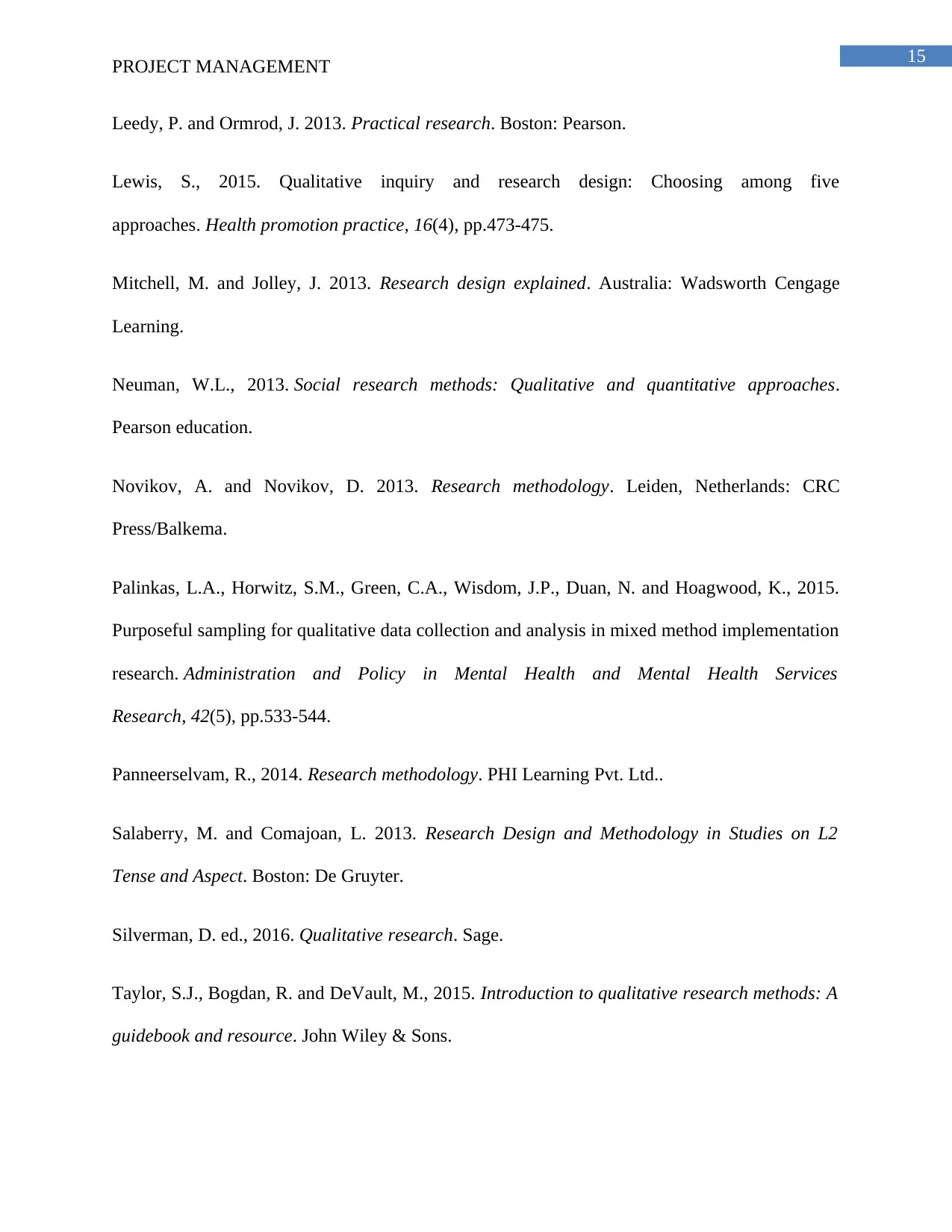
15
PROJECT MANAGEMENT
Leedy, P. and Ormrod, J. 2013. Practical research. Boston: Pearson.
Lewis, S., 2015. Qualitative inquiry and research design: Choosing among five
approaches. Health promotion practice, 16(4), pp.473-475.
Mitchell, M. and Jolley, J. 2013. Research design explained. Australia: Wadsworth Cengage
Learning.
Neuman, W.L., 2013. Social research methods: Qualitative and quantitative approaches.
Pearson education.
Novikov, A. and Novikov, D. 2013. Research methodology. Leiden, Netherlands: CRC
Press/Balkema.
Palinkas, L.A., Horwitz, S.M., Green, C.A., Wisdom, J.P., Duan, N. and Hoagwood, K., 2015.
Purposeful sampling for qualitative data collection and analysis in mixed method implementation
research. Administration and Policy in Mental Health and Mental Health Services
Research, 42(5), pp.533-544.
Panneerselvam, R., 2014. Research methodology. PHI Learning Pvt. Ltd..
Salaberry, M. and Comajoan, L. 2013. Research Design and Methodology in Studies on L2
Tense and Aspect. Boston: De Gruyter.
Silverman, D. ed., 2016. Qualitative research. Sage.
Taylor, S.J., Bogdan, R. and DeVault, M., 2015. Introduction to qualitative research methods: A
guidebook and resource. John Wiley & Sons.
PROJECT MANAGEMENT
Leedy, P. and Ormrod, J. 2013. Practical research. Boston: Pearson.
Lewis, S., 2015. Qualitative inquiry and research design: Choosing among five
approaches. Health promotion practice, 16(4), pp.473-475.
Mitchell, M. and Jolley, J. 2013. Research design explained. Australia: Wadsworth Cengage
Learning.
Neuman, W.L., 2013. Social research methods: Qualitative and quantitative approaches.
Pearson education.
Novikov, A. and Novikov, D. 2013. Research methodology. Leiden, Netherlands: CRC
Press/Balkema.
Palinkas, L.A., Horwitz, S.M., Green, C.A., Wisdom, J.P., Duan, N. and Hoagwood, K., 2015.
Purposeful sampling for qualitative data collection and analysis in mixed method implementation
research. Administration and Policy in Mental Health and Mental Health Services
Research, 42(5), pp.533-544.
Panneerselvam, R., 2014. Research methodology. PHI Learning Pvt. Ltd..
Salaberry, M. and Comajoan, L. 2013. Research Design and Methodology in Studies on L2
Tense and Aspect. Boston: De Gruyter.
Silverman, D. ed., 2016. Qualitative research. Sage.
Taylor, S.J., Bogdan, R. and DeVault, M., 2015. Introduction to qualitative research methods: A
guidebook and resource. John Wiley & Sons.
Secure Best Marks with AI Grader
Need help grading? Try our AI Grader for instant feedback on your assignments.
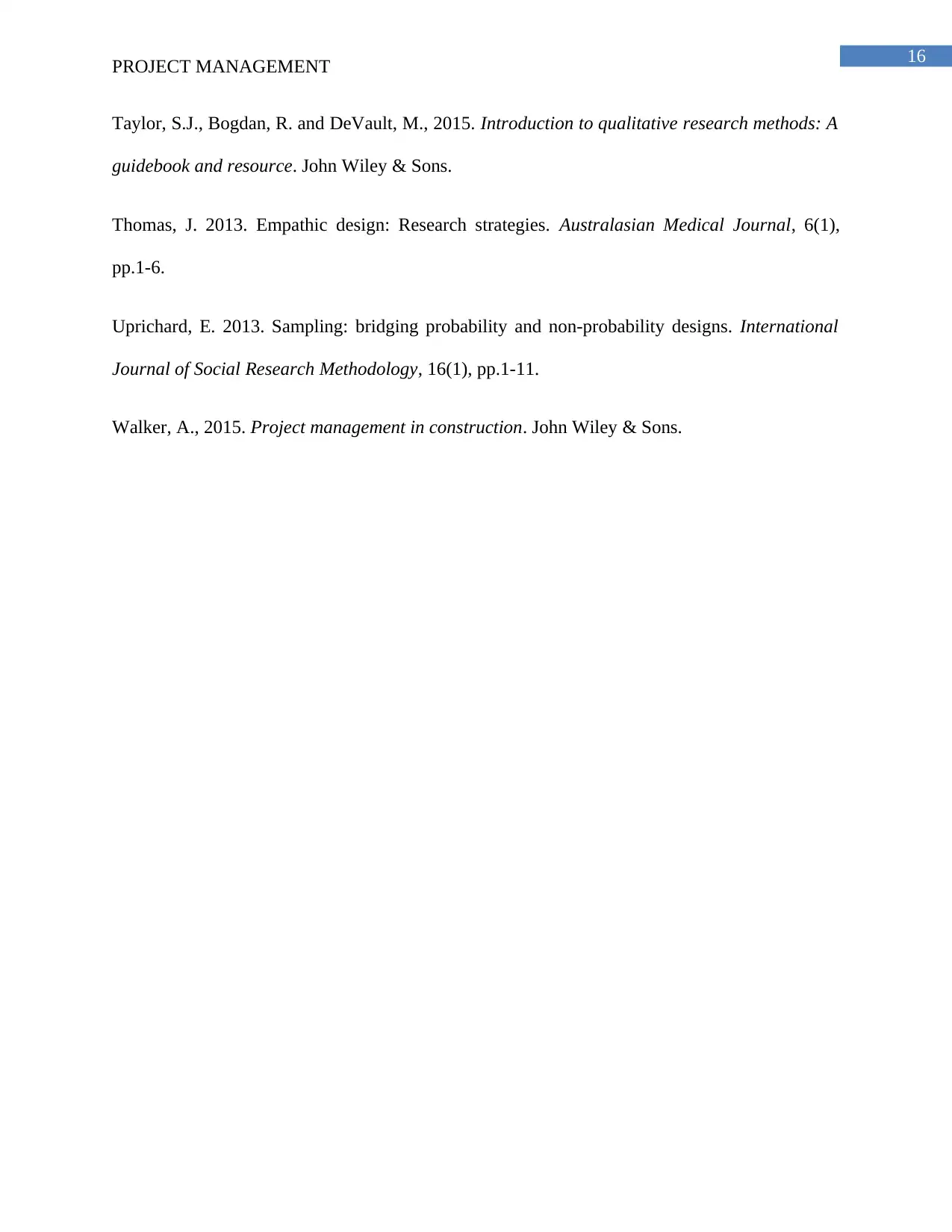
16
PROJECT MANAGEMENT
Taylor, S.J., Bogdan, R. and DeVault, M., 2015. Introduction to qualitative research methods: A
guidebook and resource. John Wiley & Sons.
Thomas, J. 2013. Empathic design: Research strategies. Australasian Medical Journal, 6(1),
pp.1-6.
Uprichard, E. 2013. Sampling: bridging probability and non-probability designs. International
Journal of Social Research Methodology, 16(1), pp.1-11.
Walker, A., 2015. Project management in construction. John Wiley & Sons.
PROJECT MANAGEMENT
Taylor, S.J., Bogdan, R. and DeVault, M., 2015. Introduction to qualitative research methods: A
guidebook and resource. John Wiley & Sons.
Thomas, J. 2013. Empathic design: Research strategies. Australasian Medical Journal, 6(1),
pp.1-6.
Uprichard, E. 2013. Sampling: bridging probability and non-probability designs. International
Journal of Social Research Methodology, 16(1), pp.1-11.
Walker, A., 2015. Project management in construction. John Wiley & Sons.
1 out of 17
Related Documents
Your All-in-One AI-Powered Toolkit for Academic Success.
+13062052269
info@desklib.com
Available 24*7 on WhatsApp / Email
![[object Object]](/_next/static/media/star-bottom.7253800d.svg)
Unlock your academic potential
© 2024 | Zucol Services PVT LTD | All rights reserved.





